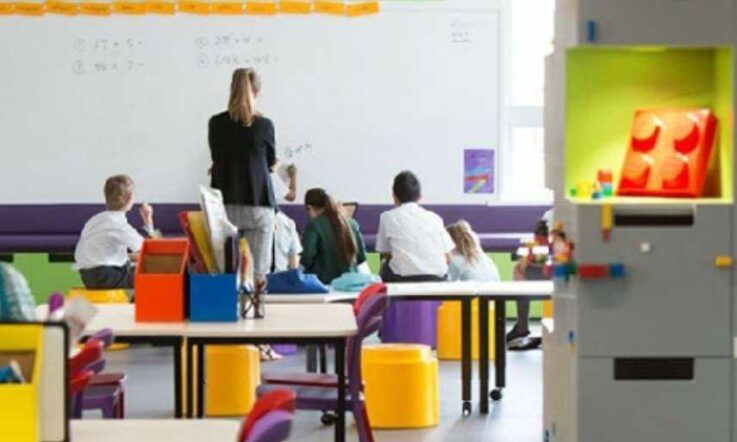There is an increasing expectation that schools and practitioners more proactively engage with evidence-informed practice, both in Australia and internationally (Cooper, Levin & Campbell, 2009).
The Australian Institute for Teaching and School Leadership (AITSL) standards clearly articulate that critical engagement with research is required across all levels of teaching proficiency in order to support teacher understanding of how students learn and how to teach (AITSL, 2011). However, there are a range of challenges that make this proposition easier said than done, including the research-practice divide and the lack of a systematic approach to translating research into real-world settings, such as the classroom (Stafford-Brizard, Cantor, & Rose, 2017).
To this end, the Science of Learning Research Centre (SLRC) – an Australian Research Council Special Research Initiative – was established in 2013 to investigate ways to promote, understand and measure learning across education, psychology and neuroscience. The SLRC Research Translation Team was formed to create mechanisms by which educators and researchers could work collaboratively to produce actionable research resulting in meaningful classroom outcomes.
Development of the SLRC Partner Schools program
SLRC translation endeavours have included teacher professional learning sessions, conference presentations, research papers, and the development of undergraduate and postgraduate course work. A key initiative in 2017 has been the establishment of the SLRC Partner Schools project, involving six schools in south-east Queensland, grouped in two networked clusters.
Through short monthly meetings, rotated across the schools, members of the translation team function as research brokers to support each of the schools to engage with science of learning research and researchers relevant to a school-identified problem of practice. Researchers are invited to present at these meetings, providing practitioners with the opportunity to engage in dialogue and establish connections directly with researchers.
Each school has developed an action-based research project around an identified issue, with the research brokers assisting in the development of research questions, literature reviews, methodology, interventions, and data analysis and interpretation. The key characteristics of this Partner Schools program are:
- involvement of five school representatives, across leadership and teaching roles;
- bi-directional dialogue between researchers and practitioners;
- exploration of school-based contextually relevant issues;
- research brokers who assist in the partnering of researchers and practitioners, and who support the development of projects;
- research summaries provided for dissemination to school communities; and,
- schools clustered in networks to provide ongoing professional support.
Partner school projects
Queensland senior secondary schooling is currently in a state of transition with the phasing out of the internally assessed, externally moderated process, and replacing it with an externally mandated curriculum and assessment. This is the most significant change to Queensland senior schooling in decades, and will require schools to make considerable changes to their teaching, learning and assessment programs across all secondary year levels. This shift to increased external assessment will require students to develop new learning strategies. Schools are commencing this transition by identifying ways to support this process. This process, and the implications for practice, has strongly influenced the direction of many of the Partner School projects.
One school is investigating how best to coach and support learners in lower secondary classrooms to use evidence-informed learning strategies such as spaced retrieval practice, interleaving, and interrogative elaboration. The aim of this study is to develop student understanding of proven strategies and improve their self-regulation (metacognition and focus). At the same time, the project will illuminate what motivates students to persist with and translate these strategies into daily practice, and not revert to previous low-utility approaches. Initial findings suggest that students who regularly employ these strategies in their study routines decreased the anxiety around and the perceived need to ‘cram' for exams through improved preparedness that effected modest improved academic performance.
Another school, also interested in how to best support their learners for this senior school transition, is investigating the explicit teaching of evidence-based strategies shown to be effective for long-term retention: using quizzing to promote learning, using cue-only judgements of learning to identify concepts for further study, and building explanations by formulating and answering deep questions. In particular, this study aims to investigate the extent to which these explicitly taught strategies transfer to the independent study environment.
Effectively engaging with learning and the strategies that best support learning is maximised when there is a strong partnership between school and the home (Jeynes, 2007). Another school within the SLRC project is exploring the factors that are limiting parental involvement in their children's learning experiences, with the aim to better understand the complex needs of the parents within their school community, and empower them to become partners in their children's learning.
Developing a common language and toolkit around effective evidence-based strategies is the aim of a fourth partner school project, looking to enhance student understanding of and engagement with effective independent learning. Each faculty in this secondary school will determine the learning strategies that are most relevant to their particular subjects, and these will then be shared across the faculties to identify commonalities as well as subject-specific evidence-informed strategies that can enhance understanding.
The changes in senior schooling means that there will be an increasing need for students to be able to respond to unfamiliar testing environments. One school within the pilot project is looking at addressing this through increasing academic risk-taking. The well-documented benefits of academic risk-taking include gains in knowledge, metacognitive strategies and feelings of increased competence, enjoyment, and reduced feelings of learned helplessness (Cetin, Ilhan, & Yilmaz, 2014; Meyer, Turner, & Spencer, 1997). The aim of this study is to establish a learning culture where students have the skills to think flexibly in unfamiliar circumstances and be able to apply content taught in multiple ways.
The final partner school intervention program is exploring ways in which student anxiety can be better managed, having noticed an increase in anxiety and anxiety-related disorders in the students in recent years. Student anxiety related to academic outcomes, and in particular, assessment, has markedly increased in recent years in many western countries, and the experience of anxiety has been shown to negatively impact learning (Anda, Felitti & Bremner, 2006; OECD, 2017; Olsen, 2014). Mindfulness has been shown to be a powerful tool for regulating emotional states and managing anxiety, and so the aim of this particular study is to determine if mindfulness strategies can be used to help students lower their anxiety levels and improve student capacity to self-regulate their anxiety.
Each of the six schools are currently underway with either the development of their interventions or the collection and analysis of data. Participants in this SLRC Partner Schools Pilot Project have reported a range of benefits from the program, including the opportunity to directly engage with researchers and research, to network with like-minded practitioners, and to engage in valuable research that is contextually relevant and meaningful.
It will be exciting to follow these partner schools as they transition into the later stages of the project, and we look forward to them sharing their findings.
References
AITSL. (2011). Australian Professional Standards for Teachers.
Anda, R. F., Felitti, V. J., Bremner, J. D., Walker, J. D., Whitfield, C. H., Perry, B. D., ... & Giles, W. H. (2006). The enduring effects of abuse and related adverse experiences in childhood. European archives of psychiatry and clinical neuroscience, 256(3), 174-186.
Cetin, B., Ilhan, M., & Yilmaz, F. (2014). An Investigation of the Relationship between the Fear of Receiving Negative Criticism and of Taking Academic Risk through Canonical Correlation Analysis. Educational Sciences: Theory and Practice, 14(1), 146-158.
Cooper, A., Levin, B., & Campbell, C. (2009). The growing (but still limited) importance of evidence in education policy and practice. Journal of Educational Change, 10(2-3), 159-171.
Jeynes, W. H. (2007). The relationship between parental involvement and urban secondary school student academic achievement: A meta-analysis. Urban education, 42(1), 82-110.
Meyer, D. K., Turner, J. C., & Spencer, C. A. (1997). Challenge in a mathematics classroom: Students' motivation and strategies in project-based learning. The Elementary School Journal, 97(5), 501-521.
OECD. (2017). PISA 2015 Results (Volume III): Students' Well-Being, PISA, OECD Publishing, Paris. http://dx.doi.org/10.1787/9789264273856-en
Olson, K. (2014). The invisible classroom: relationships, neuroscience & mindfulness in school. WW Norton & Company.
Stafford‐Brizard, K. B., Cantor, P., & Rose, L. T. (2017). Building the Bridge Between Science and Practice: Essential Characteristics of a Translational Framework. Mind, Brain, and Education, 11(4), 155-165.
The SLRC Partner Schools program is now calling for any schools interested in participating in 2018. For more information on the project, please contact the SLRC Translation Manager, Annita Nugent at a.nugent@uq.edu.au
As a school leader, or classroom practitioner, how do you keep up to date with research on effective teaching practices? Do you adapt approaches to ensure they are relevant to your school context, staff and student needs?
If you are planning to undertake an action research project or introduce an intervention program: What is the aim, with regard to student learning outcomes? What evidence and data will you collect and when? How will you measure the impact?



